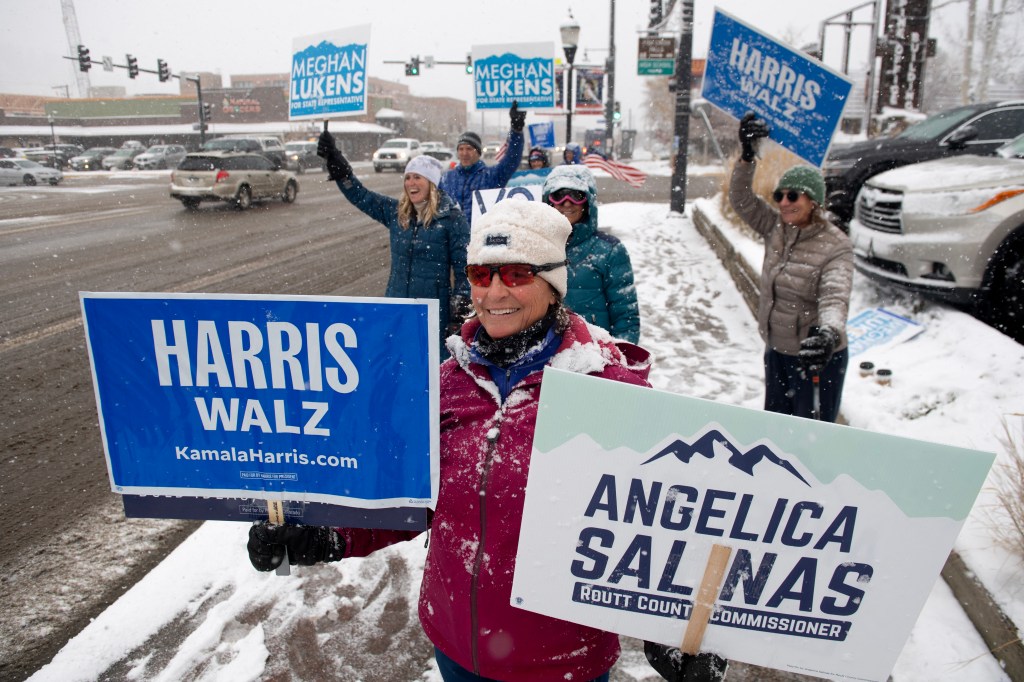By the time this column runs, days will have passed and gallons of ink spilled on the reasons behind former President Donald Trump’s comeback, what Vice President Kamala Harris could have done differently, the pathetic performance of polling companies, the nation’s shift to the right, and the public policy implications of Republican dominance over all three branches of the federal government.
We will avoid retreading here to focus on how Colorado trends both diverged and paralleled national developments.
As I write, Republicans have won the White House and the Senate, and are poised to maintain control of the House. We face weeks of recounts in some close races.
On the electoral map, Harris held Pacific coastal states and north and mid-Atlantic states. In the interior, Colorado, New Mexico, Illinois, and Minnesota stand out as islands of blue in a sea of red. Ironically, these states have all passed legislation to join the National Popular Vote Interstate Compact and pledge their electoral votes to the winner of the popular vote. This election, Colorado’s electoral votes would have gone to Trump, the winner of the popular vote, despite the voters’ preference for Harris. Fortunately, the decision to join the compact is not binding until a majority of states have joined.
Colorado has time to repeal the law authorized by Senate Bill 42 in 2019. The Electoral College has a purpose; especially for less populous states like Colorado, by allowing us to vote as a state and pledge our votes together. Our independence is worth preserving.
Colorado was one of a few states that moved slightly leftward this election. A New York Times analysis of Tuesday’s election, found counties across the nation moved right with Trump getting more support than he did in 2020. Of the 31 counties (about half) examined by the Times, two-thirds had moved left. I compared victory/loss margins between 2020 and 2024 for the 10 largest Colorado counties and found Adams, Arapahoe, and Pueblo moved slightly rightward. Boulder, Douglas, and Weld counties were stable and Jefferson, Larimer, and El Paso moved slightly leftward.
A similar trend is visible in congressional districts. Democrats won by larger margins in Districts 1, 2, and 6 this year than in 2020. Districts 3, 5, and 7 performed similarly in 2020 as in 2024. Congresswoman Lauren Boebert in District 4 performed worse than her predecessor. In fact, in right-leaning Douglas County, an equal number of voters picked her opponent Trisha Calvarese. The highly competitive 8th District had not yet been created so no comparison is available.
In the presidential race, a greater percentage of Coloradans voted for Harris and Biden than Hilary Clinton, while Trump support remained stable for all three elections. While Colorado bucked the national rightward shift, the state, like most others, experienced a dip in voter participation. Analysis by Newsweek found voter turnout was higher in 2020 nationally and in almost every state. Nationally it decreased from 66.4% to 64.5% and in Colorado from 76.7% to 74.5% this election.
Faith in our elections in Colorado, though shaken by Trump, election deniers, and their silent enablers, nevertheless remains strong. Colorado voters do not want wholesale change. Despite high-profile endorsements and millions of dollars spent on advertising, Colorado voters rejected Initiative 131. We were not the only ones to reject ranked-choice voting. Similar initiatives lost in Arizona, Idaho, Nevada, Oregon, and South Dakota. Alaska repealed its ranked choice voting law and replaced the candidate who won under the scheme two years ago. Missouri passed a ban on the practice.
Despite colossal errors by the Colorado Secretary of State and a couple of ballot thieves caught “testing the system” in Mesa County, the 2024 election went off without a hitch in Colorado. We can thank the steadfast work of every county clerk and recorder and election worker who made that happen.
Next year when January 6 insurrectionists and election saboteurs like Tina Peter are pardoned and election deniers and their silent enablers assume cabinet posts and leadership of powerful congressional committees, try not to be cynical. Instead, thank your local county clerk for enduring four years of unfair accusations and conducting the 2024 election efficiently and effectively. Your vote mattered.
Krista L. Kafer is a weekly Denver Post columnist. Follow her on Twitter: @kristakafer.
Sign up for Sound Off to get a weekly roundup of our columns, editorials and more.
To send a letter to the editor about this article, submit online or check out our guidelines for how to submit by email or mail.


